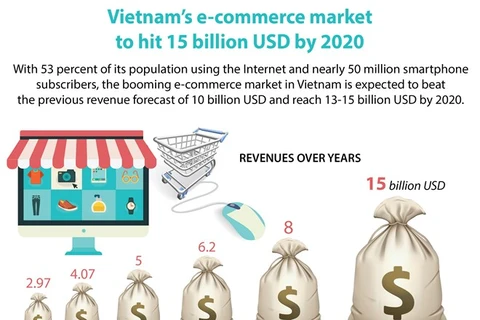Hanoi (VNS/VNA) - The Ministry of Industry and Trade plans to enhance the application of e-commerce with the aim of narrowing the digital divide, an official said at the Vietnam Online Business Forum 2019 held in Hanoi on March 26.
Nguyen Huu Tuan, a representative from the ministry’s Vietnam e-Commerce and Digital Economy Agency, said that narrowing the digital divide across the country was important.
Narrowing digital divide remained a significant challenge to Vietnam, the Vietnam e-Commerce Association (Vecom) said in its report about the e-Business Index (EBI) 2019 released at the conference.
The report revealed a huge gap in e-commerce development across the country’s 63 provinces and cities.
Vietnam’s EBI averaged 40.3 points, 2.8 points higher than in 2018. EBI is based on infrastructure and human resources, business-to-consumer, business-to-business and business-to-government transactions.
HCM City took the lead in EBI with 86.8 points, double the country’s average and nearly 60 points higher than Bac Kan, which was at the bottom of the list.
Hanoi came second with 84.3 points, followed by Hai Phong (59.6 points) and Da Nang (57.5 points).
However, the gap between the top five localities’ average EBI (68.4 points) and the average EBI of the five localities at the bottom of the list (29 points) increased to 39.4 points from 36.7 points in 2018 and 18 points in 2013.
Vecom said there was a significant difference in e-commerce development between localities and it was widening.
It was easy to understand that e-commerce tended to develop rapidly in major cities rather than others but it was important for Vietnam to narrow the digital divide, Vecom said.
Other barriers to the development of e-commerce were the lack of consumer trust and limited logistics services, Vecom said.
According to Tuan, besides narrowing the divide, the ministry would also focus on completing an e-commerce legal framework to protect the rights of consumers, especially on preventing the sale of counterfeit and poor-quality products, as well as developing an e-commerce trade promotion programme for the 2021-2025 period.
E-commerce boomed in 2018 with a growth rate of more than 30 percent, according to Vecom, rising from 2.2 billion USD revenue in 2013 to 7.7 billion USD.
Lai Viet Anh, deputy director of the Vietnam e-Commerce and Digital Economy Agency, said that revenue from Vietnam’s e-commerce market was predicted to reach 13-15 billion USD in 2020, beating the Government’s target of 10 billion USD.
According to Vecom’s report, cross-border trade had become an important channel for exports and it was estimated that around 32 percent of Vietnamese small and medium-sized enterprises had established business with foreign partners through online channels.
On the same day, the Central Institute for Economic Management (CIEM) also organised a workshop about digital trade and opportunities for Vietnam.
CIEM Director Nguyen Dinh Cung said that digital trade was expected to create significant value for Vietnam.
A report by AlphaBeta Company showed that digital trade could bring economic value worth 953 trillion VND (40.5 billion USD) for Vietnam in 2030, from 81 trillion VND in 2017.
Konstantin Matthies from AlphaBeta said that policymakers should consider the importance of digital trade to the domestic economy in developing economic and trade policies.-VNS/VNA
VNA
























